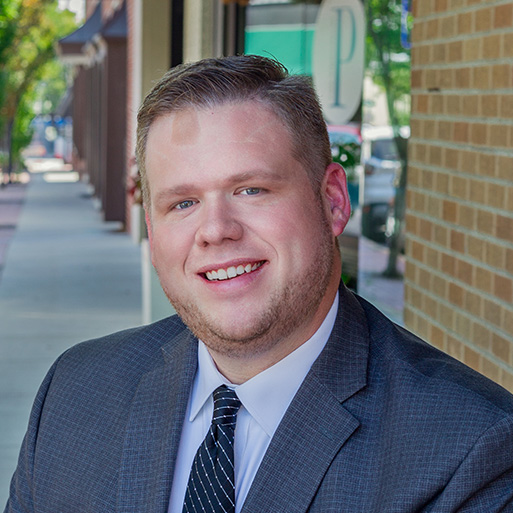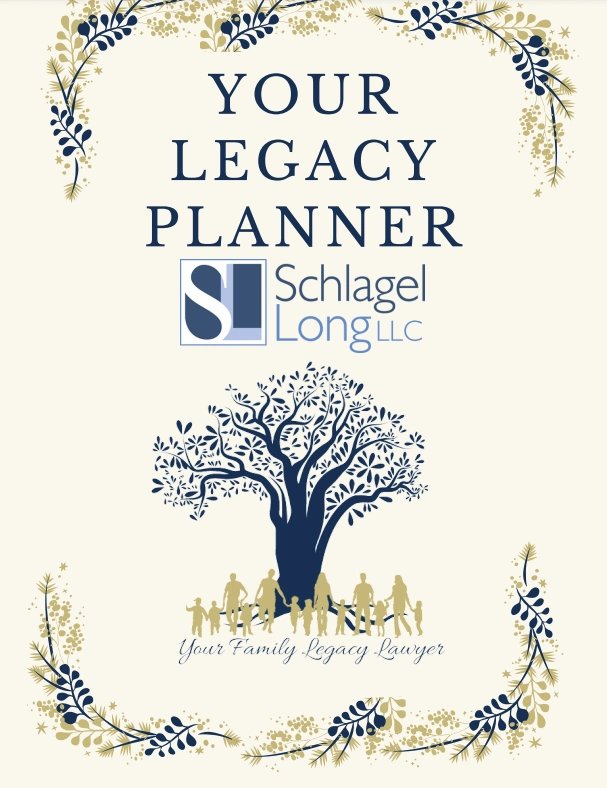Does Your Estate Plan Need a Will or a Trust or Both?
Benjamin E. Long: Expert in Estate Planning with a Focus on Wills and Trusts
Benjamin E. Long, a reputable estate planning attorney at Schlagel Long, LLC, specializes in navigating the complexities of wills and trusts, providing clients in Olathe, KS with tailored estate planning solutions. With a rich background in biology from Kansas State University and a J.D. from Washburn University School of Law, Benjamin combines his analytical skills with legal expertise to offer comprehensive estate planning services.
Schlagel Long
As the founding attorney of Schlagel Long, LLC, Benjamin’s approach is deeply personal. He understands that your estate is more than financial wealth; it’s a reflection of your life’s story, values, and the legacy you wish to leave behind. With a strong commitment to client education, Benjamin empowers individuals by clarifying the intricacies of estate planning in today’s ever-evolving legal landscape.
Philosophy
In his practice, Benjamin emphasizes the importance of understanding the differences and benefits of wills and trusts. He recognizes that each client’s situation is unique, and therefore, requires a bespoke plan that aligns with their specific needs and goals. Whether it’s a simple will or a more complex revocable or irrevocable trust, Benjamin guides his clients through making informed decisions that best protect their assets and loved ones.
Expertise
A testament to his expertise, Benjamin is a member of the American Bar Association, Kansas Bar Association, and the Johnson County Bar Association. He is admitted to practice in the U.S. District Court District of Kansas since 2011. His accolades, including the Super Lawyer Rising Star award and the Martindale-Hubbell Client Distinction Award, further underscore his dedication to excellence in estate planning and probate law.
Education
Beyond his legal practice, Benjamin is committed to education and advocacy. He serves as an adjunct faculty member at Washburn Law School and coaches the Kansas State University Mock Trial Team, sharing his knowledge and passion for the law with the next generation of legal professionals.
In summary, Benjamin E. Long is not just an attorney; he is a trusted advisor who stands by his clients as they navigate the critical decisions of estate planning. His expertise in wills, trusts, and probate law ensures that your estate planning is in capable hands, protecting your legacy for future generations.

Revocable Trust vs. Will: An Overview
“One of the most fundamental choices you can make as you’re thinking about how to pass your assets on to heirs is whether you hold assets in a revocable trust or more simply give them via a will. Both approaches have advantages, although trusts can provide significantly more benefits.”
Having a structure in place that clearly directs who is in charge and who gets what assets, gives most people a sense of relief about their estate plan. It’s important to understand how a will works, how a trust works, and when to use each of these planning tools, reports the article “Revocable trust vs. will: A guide to estate planning in the age of coronavirus” from Bankrate. In many cases, using both achieves the ultimate goal of protecting the family assets and their privacy.
Understanding How a Will Works
The will process is more complex than its typical portrayal in film or fiction. The will directs who is to receive the property of the deceased. Without a will, property may be distributed by the courts, following the “intestate succession” law of the state. That’s usually the next of kin—not always who you want to inherit your estate.
Advantages of Using a Trust in Estate Planning
If property is owned jointly, then it passes to the surviving owner. Accounts and assets with a named beneficiary go directly to that beneficiary. Any assets held in a trust are subject to the directions in the trust. That is one reason to check all accounts you own and make sure they have two named beneficiaries—primary and contingent. That applies to retirement and investment accounts, as well as life insurance policies.
The probate court appoints an executor— who should be chosen by the decedent and nominated in the will—to carry out the directions in the will, pay any outstanding debts, take care of taxes and oversee the distribution of assets. The process of administering the will can be lengthy, depending upon the size and the complexity of the estate. During probate, the will becomes a public document. Predatory creditors are able to see the will, including the amount of assets and their distribution. In many jurisdictions, there are court fees associated with probate that can take a bite (or a nibble) out of the estate.
Trusts are used to circumvent some of the issues created when assets are passed via a will. Trusts are legal structures that provide protection for assets. The assets in a trust do not belong to the individual, they belong to the trust. Therefore, they are not subject to probate. When the trust is created, a trustee is named whose job it is to manage the affairs of the trust. A successor trustee is named to manage the trust, if the trustee cannot or will not serve.
Types of Trusts: Revocable and Irrevocable
The revocable trust is used to take assets out of the estate, while allowing the asset owner to maintain control. Assets can be moved in or out of the trust, or the trust can be dissolved, and the assets taken back. However, there are no tax benefits, since the trust owner is the trust maker, the trustee, and the beneficiary, as long as the owner is alive. On the owner’s passing, the designated successor trustee takes over.
With an irrevocable trust, there are significant tax benefits. However, there is also a loss of control of the assets.
Considerations When Choosing Between a Revocable Trust and a Will
Trusts do cost more to establish than wills, but they offer a number of advantages. The use of a trust means that less or none of your assets will go through probate, speeding up the distribution process. Trusts also protect the family’s privacy, since the details in the trusts do not become part of the public record. There is less involvement by the court in distributing assets, so fees may be lower.
Speak with an estate planning attorney about how trusts may play a useful part in your estate plan and for passing wealth down to multiple generations.
Reference: Bankrate (April 17, 2020) “Revocable trust vs. will: A guide to estate planning in the age of coronavirus”

Estate Planning Legacy Planner
Everyday, we work with people who have lost someone they care about. There is so much these folks have to organize and manage. This planner organizes the information they will most need, in our experience, saving so much time and unnecessary cost. Besides organizing your information, it's so important to have a good estate plan that will keep your family out of court and conflict.
Please use the button below to receive a free copy of our Estate Planning Legacy Planner, an organization tool essential to any estate plan designed to help your loved ones take care of you and handle your affairs.
